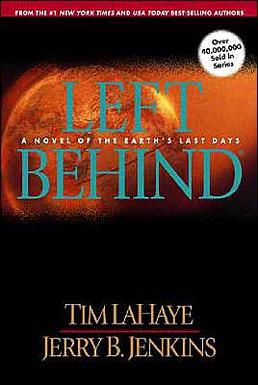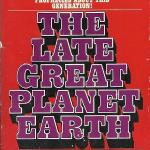(Originally posted July, 2005.)
Left Behind, pp. 121-123
Rayford Steele is grieving. He has begun what in the world of Left Behind passes for an existential crisis.
Rayford Steele lay on his back, staring at the ceiling. … He didn’t want to watch the news. He didn’t want to read the paper, even knowing a new one had flopped up onto the porch before dawn.
 This much is true. The paper would still arrive. It might be a lousy paper that unquestioningly parrots official government talking points. It may have only a dwindling news hole that it fills up with unfiltered wire copy. But the paper would still arrive. On time. Damn straight it would. This is a point of pride for those of us who participate in the daily miracle of a daily newspaper: In case of apocalypse, come in early.
This much is true. The paper would still arrive. It might be a lousy paper that unquestioningly parrots official government talking points. It may have only a dwindling news hole that it fills up with unfiltered wire copy. But the paper would still arrive. On time. Damn straight it would. This is a point of pride for those of us who participate in the daily miracle of a daily newspaper: In case of apocalypse, come in early.
But Rayford doesn’t reach for the newspaper, he reaches for the Bible. These pages provide his first encounter with that book and help to set the stage for his coming conversion.
I like a good conversion story — whether it’s the tweedy, cerebral argument of C.S. Lewis, or the sudden, ecstatic certainty of Pascal, or the earthy epiphanies of Anne Lamott (“Fuck it. Come in. I quit.”).
But this isn’t a good conversion story. It’s a manipulative little polemic in which fictional events prove that Irene Steele was right and all those who disagreed with her or mocked her or failed to buy her books and DVDs were wrong. That’s not exactly the stuff of Augustine’s Confessions.
He wanted to investigate, to learn, to know, to act. He started by searching for a Bible, not the family Bible that had collected dust on his shelf for years, but Irene’s. Hers would have notes in it, maybe something that would point him in the right direction.
This is what premililennial dispensationalists mean by sola scriptura. The meaning of life and salvation is found in the Bible, but only if that Bible includes the notes and commentary — the gnostic keys to interpretation — that explain what it really means. It’s an odd twist on the so-called common-sense literalism that shapes American evangelicals’ approach to the Bible. The PMDs claim, as all evangelicals do, that the meaning of scripture is self-evident, unambiguous — that “it means what it says and it says what it means.” The idea that tradition or community could be useful or necessary for informing the interpretation of scripture is viewed with suspicion, if not hostility.
This rejection of tradition makes possible idiosyncratic new interpretive frameworks, such as the prophecy schemes of PMD. But these innovative, heterodox frameworks in turn impose their own, new “traditions” that shape the meaning of the text for their adherents. These new traditions continue to think of themselves as antitraditionalist. Thus the strange phenomenon of elaborate schemes like PMD or “scientific creationism” that introduce thousands of elements nowhere present in the text, yet still claim to be based on naive, common-sense, literal readings. For such schemes to make sense, you can’t just read any old family Bible, you have to read Irene’s annotated version, under the guidance of an experienced adept.
Rayford again seems to be aware that he is a character in “a novel of the earth’s last days,” so he begins reading on the last page of the Bible. He hoped, Jenkins writes, to find a:
… verse at the end of the Bible that said something like, “In the end God took all his people to heaven and gave everybody else one more chance.”
But no such luck. The very last verse in the Bible meant nothing to him. It said, “The grace of the Lord Jesus be with you all. Amen.” And it sounded like the religious mumbo jumbo he had heard in church.
LaHaye and Jenkins are eager to establish in this section that Rayford, for years, attended a spiritually dead church filled with hollow, “religious mumbo jumbo.” But it’s hard to see how Revelation 22:21 could be so baffling to anyone. One needn’t be a sectarian believer to understand this simple benediction, but L&J treat it as though it were an opaque expression of the deepest mysteries of the faith.
Perhaps for them it is. “The grace of the Lord Jesus” is not exactly a theme of LB. And the remainder of this final verse in the Bible — “be with you all” — suggests several other questions that L&J do not want to see answered. Who is “you all”? To whom, in other words, was this book addressed? When and why was it written for them? Start asking or answering questions like those and it becomes much more difficult to pretend that John’s apocalypse is a Nostradamus-like piece of fortune-telling meaningful only to Christians in these, the last days, and irrelevant to all believers throughout the intervening millennia.
Rayford next figures out what the red type in Irene’s Bible signifies — “He … noticed on the spine, ‘Words of Christ in red.'” — and begins skimming the red text at the end of the book and meditating on the delayed parousia.
So Jesus said he was coming quickly. Had he come? And if the Bible was as old as it seemed, what did “quickly” mean? It must not have meant soon, unless it was from the perspective of someone with a long view of history. Maybe Jesus meant that when he came, he would do it quickly. …
All these questions and maybes will, of course, be dealt with later in the book with a mind-numbing didacticism and a stifling, spirit-quenching tone.
But the next thing that happens here is extraordinary, evidence that even L&J can’t always miss with good material:
Rayford could make no sense of the text of the chapter. It seemed old and formal. But near the end of the chapter was a verse that ended with words that had a strange impact on him. Without a hint of their meaning, he read, “Let the one who is thirsty come; let the one who wishes take the water of life without cost.”
Here, for a glimmer of an instant, L&J stumble across a hint of what even good conversion stories struggle to convey, that numinous experience that even the cerebral Lewis described as being “Surprised by joy.” L&J quickly smother this little spark of something genuine, piling on deadening exposition (“But what was the water of life?” Rayford wonders).
That verse in Revelation echoes one of my favorite passages, from Isaiah 55. So, rather than letting Irene’s Bible have the last word, let me quote that here:
Come, all you who are thirsty, come to the waters;
and you who have no money, come, buy and eat!
Come buy wine and milk without money and without cost.
Why spend money on what is not bread,
and your labor on what does not satisfy?
Listen, listen to me, and eat what is good,
and your soul will delight in the richest of fare …













